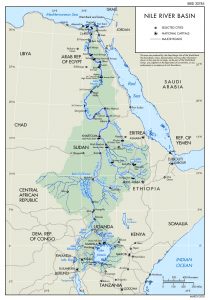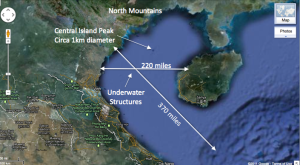Milky Way
Nile River *
 The River Nile was considered the longest river in the world, a title now disputed by the Amazon.(a) More important was the part it played in the development of pharoanic Egypt. Understandably, it also played a part in the mythology and religion of ancient Egypt.
The River Nile was considered the longest river in the world, a title now disputed by the Amazon.(a) More important was the part it played in the development of pharoanic Egypt. Understandably, it also played a part in the mythology and religion of ancient Egypt.
In 2019 a paper(d) by Larry Pahl, who looked again at the Orion Correlation Theory and concluded that Robert Bauval should not have confined his theory to Orion’s ‘belt’, but looked at the entire constellation and sought a more extensive reflection on the monuments of ancient Egypt. Prahl then proceeds to do exactly that.
Similarly, Jean-Pierre Lacroix claimed that other Egyptian structures may have been located to reflect the layout of other constellations in the sky. Specifically, he focuses on Aries and Thebes(e) .
Alessandro Berio went further with the claim(f) that the entire Nile was ‘designed’ to be a reflection of the constellations above!
Philip Coppens commenting on how the Incas viewed the valley of Cusco wrote “Modern research suggests that the Sacred Valley of the Vilcamayu and Urubamba rivers symbolised the Milky Way. Identifying rivers with constellations, specifically the Milky Way, is nothing new. Other examples are the Nile, as well as the Po in Italy and the Rhône in France.”(b)
Derek Cunningham claims to have discovered(c) that there is an association between the layout of the Stonehenge complex with the Milky Way!
(a) Nile – Wikipedia
(b) Viracocha’s voyage – Eye Of The Psychic
(c) https://atlantipedia.ie/samples/archive-3055/
(d) https://www.academia.edu/41868838/Expanding_the_Orion_Correlation_Theory_OCT_
Cunningham, Derek
Derek Cunningham is the author of a website(a) with an extensive amount of material devoted to archaeoastronomy. His core idea is that there existed in ancient times a World Map based on the the Cygnus constellation, echoing some of Andrew Collins’ work[075].
Included on his site is an article that somehow links a painting, allegedly a map, in the Lascaux Cave with a location in Viet Nam’s Gulf of Tonkin, which Cunningham describes as having “dimensions and geographical features similar to Plato’s description of Atlantis.” He later adds that “of all the various locations proposed, this is the only site that appears consistent with Plato’s description.” As a layman I found the article and the site in general, totally confusing, forcing me to lie down in a darkened room.
However, I cannot deny that Cunningham has put a lot of work into his site and he does have fans(b), but his ideas are too ‘way out’ for me.
His most recent ‘discoveries’(c) include an association of the layout of the Stonehenge complex with the Milky Way!
Cunningham has published his theories in two books, Khyung The Stone Age Astronaut[954] and 400,000 Years of Stone Age Science[955].
He later extended his studies to the remarkable terraced walls of Sacsayhuamán near Cuzco in Peru. In a 2014 illustrated article in Popular Archaeology online magazine, he claimed that the angles of the adjoining ends or sides of the irregular yet tightly fitting stones have astronomical significance!
Cunningham, has now turned his attention to angles inscribed at ancient sites, which he now claims can be associated with astronomical features and events. His extensive article(e) on the Migration and Diffusion website deals with a great many numbers that I shall leave others to evaluate.
(a) See: https://www.midnightsciencejournal.com
(b) https://thothistheibis.wordpress.com/tag/brodgar-complex/
(c) See: https://atlantipedia.ie/samples/archive-3055/
(e) https://www.migration-diffusion.info/article.php?year=2016&id=486
Gétaz, Claude
 Claude Gétaz is a Swiss researcher who offers a celestial interpretation of the Atlantis story employing astromythology. He contends that Atlantis is the Milky Way and in his words “gods and men were planets, stars or constellations”. This is comparable with the last theory proposed by Alan Alford.
Claude Gétaz is a Swiss researcher who offers a celestial interpretation of the Atlantis story employing astromythology. He contends that Atlantis is the Milky Way and in his words “gods and men were planets, stars or constellations”. This is comparable with the last theory proposed by Alan Alford.
Gétaz’s Atlantis ideas are available in a twenty-page 2009 paper on the Internet, translated from the French.
The totality of his work is available in 14 pdf files(a).
>Gétaz is now retired and living in Brazil.<
(a) Quand les dieux et les hommes étaient des planètes, des étoiles ou des constellations (archive.org) *


